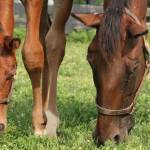Shedding Light on Melatonin in Mares

Melatonin plays an important role in reproduction. Researchers know, for example, that melatonin levels increase in the dark winters, ushering mares into anestrus, the period when many do not come into heat. With increasing daylight in the spring, melatonin levels decrease, stimulating mares to begin cycling.
“In the Northern Hemisphere, melatonin levels are lowest in June, coinciding with highest natural fertility,” said Kathleen Crandell Ph.D., a nutritionist for Kentucky Equine Research.
Human research shows that melatonin has other important roles in reproduction. Melatonin is produced by the placenta, and levels of melatonin increase during pregnancy. One human study showed melatonin was three times higher just days before parturition than in the first trimester, and remarkably higher than in nonpregnant women.
“Melatonin and its metabolites reportedly protect the ‘maternal-fetal-placental’ unit by stimulating antioxidant activity and playing a key role in the developing central nervous system of the fetus,” Crandell said.
Given this knowledge, equine researchers suggested that higher melatonin production may help prepare the mare for foaling and ensure the neonate’s chances of survival.* They hypothesized that melatonin levels would be similar between mares and foals at the time of parturition due to the maternal-fetal-placental connection.
The research team collected blood samples from pregnant mares during the first 12 hours after foaling. Melatonin levels were significantly higher in mares than foals, so researchers rejected the hypothesis.
“The reason why melatonin was lower in foals at birth is unclear as research in this field is in its infancy. However, further research is warranted to determine the influence of melatonin on the foal’s overall health at the time of birth,” Crandell explained.
Another way to support a neonatal foal’s health is to ensure adequate intake of colostrum immediately after birth. Foals are born with an immature immune system and require infection-fighting antibodies found in the mare’s first milk, the colostrum, to protect them from disease.
“Supplementing pregnant mares with omega-3 fatty acids improves colostrum quality and enhances passive transfer of antibodies to foals,” shared Crandell. “The omega-3 fatty acids DHA and EPA may also be beneficial because their diets prior to parturition tend to be heavy in omega-6 fatty acids, as they are frequently composed entirely of grain mixes and hay, often with additional vegetable oil added to increase calories. Thus, supplementing with omega-3 fatty acids may help counteract the potential imbalance between omega-3s and omega-6s.”
*Gáspárdy, A., G. Gallagher, and B. Bartha. 2023. Plasma melatonin concentration during the early post-partum period in Thoroughbred mares and their foals. Acta Veterinaria Hungarica 71(2):119-127.








